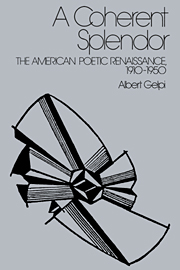Book contents
- Frontmatter
- Contents
- Acknowledgments
- Dedication
- Introduction. The Janus-Face of Romanticism and Modernism
- 1 Robert Frost and John Crowe Ransom: Diptych of Ironists, the Woodsman and the Chevalier
- 2 Wallace Stevens: World as Mundo, Mundo as World
- 3 T. S. Eliot: The Lady Between the Yew Trees
- 4 Ezra Pound: Between Kung and Elcusis
- 5 H. D.: Helen in Bethlehem, Hilda in Egypt
- 6 William Carlos Williams: Mother-Son and Paterson
- 7 Allen Tate and Hart Crane: Diptych with Angels and Demons
- Coda. Yvor Winters and Robinson Jeffers: The Janus-Face of Anti-Modernism
- Notes
- Index
6 - William Carlos Williams: Mother-Son and Paterson
Published online by Cambridge University Press: 22 January 2010
- Frontmatter
- Contents
- Acknowledgments
- Dedication
- Introduction. The Janus-Face of Romanticism and Modernism
- 1 Robert Frost and John Crowe Ransom: Diptych of Ironists, the Woodsman and the Chevalier
- 2 Wallace Stevens: World as Mundo, Mundo as World
- 3 T. S. Eliot: The Lady Between the Yew Trees
- 4 Ezra Pound: Between Kung and Elcusis
- 5 H. D.: Helen in Bethlehem, Hilda in Egypt
- 6 William Carlos Williams: Mother-Son and Paterson
- 7 Allen Tate and Hart Crane: Diptych with Angels and Demons
- Coda. Yvor Winters and Robinson Jeffers: The Janus-Face of Anti-Modernism
- Notes
- Index
Summary
As Pound's irrepressible arrogance seemed, in the eyes of most of the American literary public, to veer dangerously toward insane or criminal behavior – the poet as crank, the prophet as crackpot and bigot – Pound's lifelong friend, fellow student, and brother poet at the University of Pennsylvania took on something of the venerable, lovable aura of Whitman: the American bard as doctor and healer, as cultural wound dresser. There are many connections between Whitman and William Carlos Williams. They were both volatile, contradictory, calculatedly outgoing personalities with a dark understreak of depression and self-doubt. Toward the end of his life, Wallace Stevens spoke of Williams as a “man somehow disturbed at the core and making all sorts of gestures… to conceal it from himself,” just as earlier, in the 1920s, he had warned Williams, to Williams' annoyance, that his inconsistent shifting of perspective consigned him to “incessant new beginnings,” which would end in “sterility.” Although it is true of all poets that their poetry serves to express the discordant aspects of their psyches, it is truest, most urgent, and most difficult for poets like Whitman and Dickinson, Pound and Williams, who, unlike Stevens or Frost, take the risk of entrusting more of their personal contradictions to the alembic of poetry in the hope of transmutation and resolution.
“Incessant new beginnings,” instead of elaboration and development. Whitman said that each poem was a new venture, but over the years he came to operate from an increasingly explicit philosophical position. Williams did not have Whitman's metaphysics (in fact, scorned it) or the philosophic turn of mind which steadied Stevens' and Frost's composure from an aesthetic distance.
- Type
- Chapter
- Information
- A Coherent SplendorThe American Poetic Renaissance, 1910–1950, pp. 321 - 372Publisher: Cambridge University PressPrint publication year: 1988



